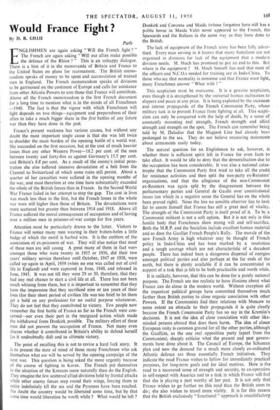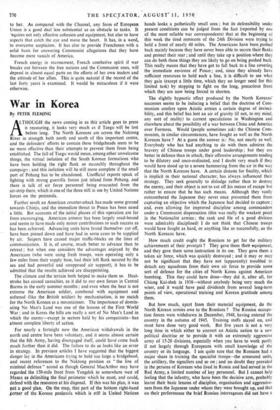Would France Fight ?
By D. IL GILLIE Parts
ENGLISHMEN are again asking " Will the French fight ? " The French are again asking " Will our allies make possible the defence of the Rhine ? " This is an unhappy dialogue. There is a hint of it in the memoranda of Britain and France to the United States on plans for rearmament. The British memo- randum speaks of money to be spent and accumulation of trained men in England. The French memorandum speaks, of divisions to be garrisoned on the continent of Europe and calls for assistance from other Atlantic Powers to arm those that France will contribute. Above all the French memorandum is the first French document for a long time to mention what is in the minds of all Frenchmen —1940. The fact is that the vigour with which Frenchmen will fight depends on two things—equipment and preparedness of their allies to take a much bigger share in the first battles of any future war than they have done in the past.
France's present weakness has various causes, but without any doubt the most important single cause is that she was left twice to shoulder the main burden of the opening battle of a world war. She succeeded on the first occasion, but at the cost of much heavier losses than any other Western Power-18.2 per cent. of the men between twenty and forty-five as against. Germany's 15.5 per cent. and Britain's 8.8 per cent. As a result of the enemy's initial pene- tration she also suffered intensive devastation of a belt from the Channel to Switzerland of which some ruins still persist. About a quarter of her casualties were suffered in the opening months of the war, and must therefore at one time have substantially exceeded the whole of the British forces then in France. In the Second World War France failed in her attempt to stop the gap. The cost in lives was much less than in the first, but the French losses in the whole war were still higher than those of Britain. The devastations were more scattered but greater than between 1914 and 1918. Above all France suffered the moral consequences of occupation and of having over a million men in prisoner-of-war camps for five years.
Attention must be particularly drawn to the latter. Visitors to France will notice many men wearing in their button-holes a little badge of which the motif is barbed wire. It is the emblem of the association of ex-prisoners of war. They will also notice that most of these men are still young. A great many of them in fact were amongst those who were twenty in 1935 or 1936, did their two years' military service therefore until October, 1947 or 1938, were called up- again in April, 1939 (when no one was called out of civil life in England) and were captured in June, 1940, and released in June, 1945. It was not till they were 29 or 30, therefore, that they had any real chance to start a civil life at all. There has not been much whining from them, but it is important to remember that they have the impression that they sacrificed nine or ten years of their lives (for their short period of civilian life was too brief to let them get a hold on any profession) for no useful purpose whatsoever. They do not feel that they contributed to victory. Few people now remember the first battle of France as far as the French were con- cerned—nor even their part in the rearguard action .which made the withdrawal from Dunkirk possible. The military effort of these men did not prevent the occupation of France. Not many even discuss whether it contributed to Britain's ability to defend herself (as it undoubtedly did) and to ultimate victory.
The point of recalling this is not to revive a hard luck story. It is to present the state of mind of those many Frenchmen who ask themselves what use will be served by the opening campaign of the next war. This question is being asked the more urgently because of the course of fighting in Korea. The French put themselves in the situation of the Koreans more naturally than do the English. They imagine the few scattered allied divisions held by frontal attacks while other enemy forces seep round their wings, forcing them to retire indefinitely till the sea and the Pyrenees have been reached. No doubt the country would be.liberated some time, but by that some time would liberation be worth while ? What would be left ? Dunkirk and Corunna and Maida (whose forgotten hero still has a public house in Maida Vale) never appeared to the French, the Spaniards and the Italians in the same way as they have done to the British.
The lack of equipment of the French army has been fully adver- tised. Every man serving in it knows that many battalions are not organised in divisions for lack of the equipment that a modern division needs. M. Moch has promised to put an end to this. But where is the equipment ? M. Moch himself has said that most of the officers and N.C.O.s needed for training are in Indo-China. To those who say that neutrality is nonsense and that France must fight, many Frenchmen answer " What with ? "
This scepticism must be overcome. It is a genuine scepticism, even though it is strengthened by the universal human inclination to slippers and peace at any price. It is being exploited by the incessant and intense propaganda of the French Communist Party, whose military task is to prevent France from fighting at all. This scepti- cism can only be conquered with the help of deeds, by a sense of constantly mounting real strength, French strength and allied strength and strength on the spot. The French can remember being told by M. Daladier that the Maginot Line had already been prolonged to the sea. They .do not believe reassuring statements about armaments easily today.
The natural question for an Englishman to ask, however, is whether there is sufficient spirit left in France for even facts to take effect. It would be idle to deny that the demoralisation due to the occupation has been considerable. It was also a national catas- trophe that the Communist Party first tried to take all the credit for resistance activities and then split the non-party ex-Resisters' organisations, and that the allegiance of the non-Communist ex-Resisters was again split by the disagreement between the parliamentary parties and General de Gaulle over constitutional issues (on which in a negative sense the General has on the whole been proved right). None the less no sensible observer has to look far to assure himself that France has still a great deal of vitality. The strength of the Communist Party is itself proof of it. To be a Communist militant is not a soft option. But it is not only in this hostile body that Frenchmen show strong will and self-sacrifice. Both the M.R.P. and the Socialists include excellent human material and so does the Gaulli.st French People's Rally. The morale of the new French Army is high whatever may be thought of French policy in Indo-China and has been marked by a resolution and a tough courage which are not characteristic of a decadent people. There has indeed been a dangerous dispersal of energies amongst political parties and also perhaps at the far ends of the earth, but there is plenty available if it can be concentrated in support of a task that ,is felt to be both practicable and worth while.
It is unlikely, however, that this can be done for a purely national purpose. The French are too realistic to have illusions about what France can do alone in the modern world. Without exception all the important political groups have committed themselves much farther than British parties to close organic association with other Powers. If the Communists find their relations with Moscow to some extent an obstacle to their propaganda it is quite clearly because the French Communist Party has no say in the Kremlin's decisions. It is not the idea of close association with other like- minded persons abroad that does them harm. The idea of closes European unity is common ground for all the other parties, although the Gaullists, as the one real opposition party (apart from the Communists), sharply criticise what the present and past govern- ments have done about it. The Council of Europe, the Schuman plan and now the demand for a much more closely co-ordinated Atlantic defence are three essentially French initiatives. They indicate the road France wishes to follow for immediately practical purposes, for long-term goals and for ideal motives. Here is the road to a recovered sense of strength and security, to co-operation in self-respect with America and to a task in which France will feel that she is playing a part worthy of her past. It is not only that France wishes to go further on this road than the British seem to do ; she also wishes to travel more visibly. It is for this reason that the British exclusively "functional "approach is unsatisfactory
to her. As compared with the Channel, any form of European Union is a good deal less substantial as -an obstacle to tanks. It 'equires not only effective cohesion and equipment, but also to have aspects that catch the eye and move the heart. It has, in a word, to overcome scepticism. It has also to provide Frenchmen with a solid basis for answering Communist allegations that they have become mere vassals of America.
French energy in rearmament, French combative spirit if war breaks out between the free nations and the Communist ones, will depend in almost equal parts on the efforts of her own leaders and the attitude of her allies. This is quite natural if the record of the last forty years is examined. It would be miraculous if it were otherwise.



































 Previous page
Previous page